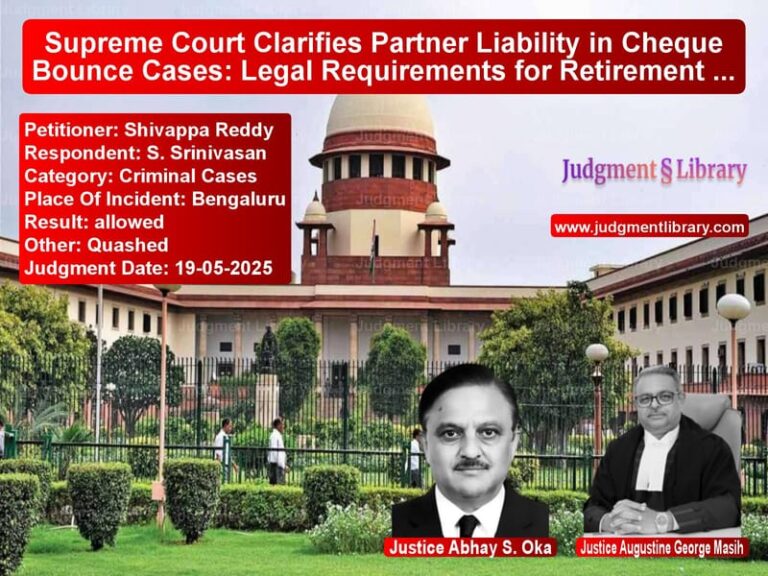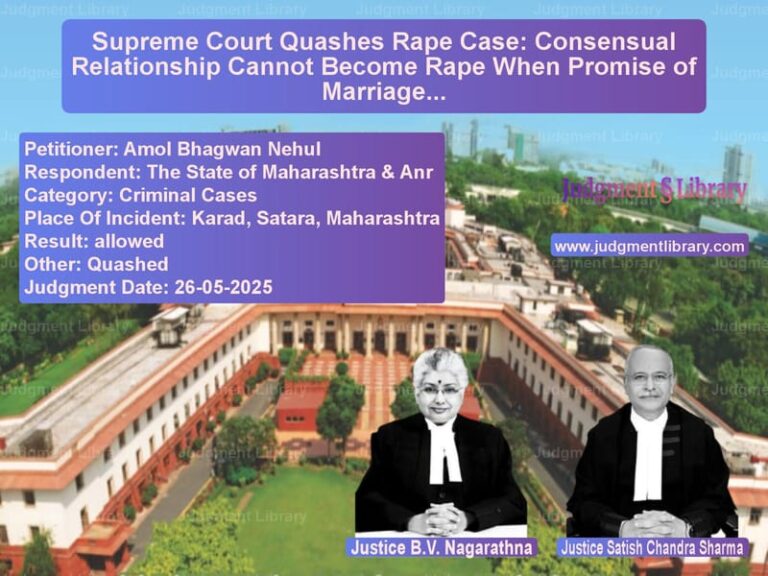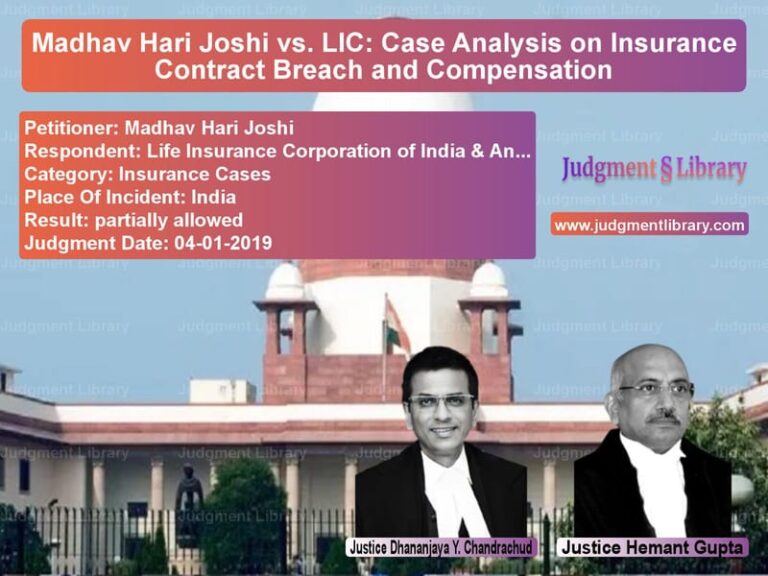Supreme Court Reduces Conviction from Murder to Culpable Homicide in Caste Conflict Case
The case of Khuman Singh vs. State of Madhya Pradesh revolved around a caste-related conflict that led to the killing of Veer Singh. The Supreme Court, in its judgment dated 27th August 2019, reduced the appellant’s conviction from murder under Section 302 IPC to culpable homicide not amounting to murder under Section 304 Part II IPC. The ruling emphasized the role of sudden provocation and lack of premeditation in criminal liability.
Background of the Case
On 14th August 2005, the deceased, Veer Singh, was cultivating his field while his relatives were grazing cattle nearby. The appellant, Khuman Singh, entered the field and allowed his buffaloes to graze on the crops. When Veer Singh objected and drove the buffaloes away, the appellant became furious. He allegedly abused Veer Singh by referring to his caste and, in a fit of rage, struck him on the head with an axe multiple times, causing fatal injuries.
The incident was witnessed by three relatives of the deceased, who testified against the appellant. A post-mortem confirmed six injuries on Veer Singh’s head, leading to the registration of a case under Section 302 IPC and Section 3(2)(v) of the Scheduled Castes and Scheduled Tribes (Prevention of Atrocities) Act, 1989. The trial court convicted the appellant and sentenced him to life imprisonment, a decision later upheld by the Madhya Pradesh High Court.
Key Issues in Dispute
- Whether the act was premeditated or occurred in the heat of the moment.
- Whether the provisions of the Scheduled Castes and Scheduled Tribes (Prevention of Atrocities) Act were applicable.
- Whether the conviction under Section 302 IPC should be altered based on the nature of the provocation.
Arguments by the Petitioner (Khuman Singh)
- The act was not premeditated but occurred due to a sudden altercation.
- The appellant had no intention of killing the deceased and merely acted in a fit of rage.
- The caste-related abuses were uttered in the heat of the moment and not as part of a planned attack.
- The conviction should be reduced from murder to culpable homicide under Section 304 IPC.
Arguments by the Respondents (State of Madhya Pradesh)
- The appellant deliberately attacked Veer Singh multiple times with an axe, demonstrating clear intent to kill.
- The act was not merely impulsive but was an assertion of caste dominance.
- The presence of eyewitnesses and forensic evidence confirmed the gravity of the offense.
- The conviction under both IPC and SC/ST Act was justified based on the evidence.
Supreme Court’s Observations
1. Lack of Premeditation
The Supreme Court found that the altercation arose spontaneously and was not pre-planned. It ruled:
“The entire incident was in a sudden fight over grazing buffaloes, which escalated in the heat of the moment. There was no premeditation.”
2. Applicability of Exception 4 to Section 300 IPC
The Court noted that the case fell under Exception 4 to Section 300 IPC, which applies when a person kills another without premeditation in a sudden fight without taking undue advantage. It observed:
“The appellant, in the spur of the moment, inflicted blows on the deceased’s head. The knowledge that such an act could cause death is present, but the intention to murder is absent.”
3. Conviction Under SC/ST Act
The Court found that while caste-related abuses were hurled, there was no clear evidence that the attack was motivated solely by the victim’s caste. It ruled:
“To attract Section 3(2)(v) of the SC/ST Act, the offense must be committed solely because the victim belonged to a Scheduled Caste. In this case, the altercation arose due to a land dispute, and caste was mentioned in the heat of the moment.”
Final Verdict
- The Supreme Court altered the conviction from murder (Section 302 IPC) to culpable homicide not amounting to murder (Section 304 Part II IPC).
- The conviction under SC/ST Act was quashed due to lack of clear intent.
- The appellant was sentenced to time already served (over 13 years) and ordered to be released immediately.
Implications of the Judgment
- Reaffirms that lack of premeditation can lead to a reduced sentence.
- Clarifies that caste-related offenses under the SC/ST Act require clear intent, not just verbal abuse.
- Ensures that courts consider provocation and context before assigning the highest punishment.
- Sets a precedent for cases involving sudden fights that escalate to homicide.
Conclusion
The Supreme Court’s ruling in this case balances justice by considering the nature of the provocation and lack of premeditation. By modifying the conviction, the judgment ensures that legal principles are applied fairly, distinguishing between intentional murder and impulsive acts of violence. This case sets a precedent for handling similar disputes arising from land and caste conflicts.
Petitioner Name: Khuman Singh.Respondent Name: State of Madhya Pradesh.Judgment By: Justice R. Banumathi, Justice A.S. Bopanna.Place Of Incident: Madhya Pradesh.Judgment Date: 27-08-2019.
Don’t miss out on the full details! Download the complete judgment in PDF format below and gain valuable insights instantly!
Download Judgment: Khuman Singh vs State of Madhya Prad Supreme Court of India Judgment Dated 27-08-2019.pdf
Direct Downlaod Judgment: Direct downlaod this Judgment
See all petitions in SC/ST Act Case
See all petitions in Attempt to Murder Cases
See all petitions in Judgment by R. Banumathi
See all petitions in Judgment by A. S. Bopanna
See all petitions in partially allowed
See all petitions in Modified
See all petitions in supreme court of India judgments August 2019
See all petitions in 2019 judgments
See all posts in Criminal Cases Category
See all allowed petitions in Criminal Cases Category
See all Dismissed petitions in Criminal Cases Category
See all partially allowed petitions in Criminal Cases Category







